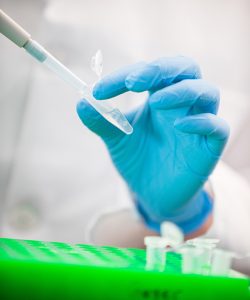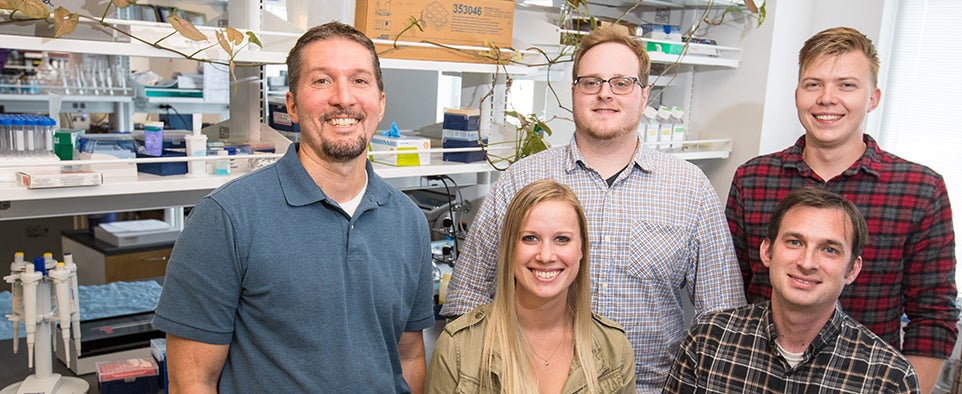REPRODUCTIVE RESEARCH
Project aims for understanding of first stages of reproduction
Students in Dr. Christopher Geyer’s lab at East Carolina University’s Brody School of Medicine are working to understand and explain the earliest stages of reproduction thanks to a five-year, $1.45 million grant.
“We hope to understand more about how the stem cell population is formed at the beginning of development, as well as how it’s maintained throughout,” Geyer said.
At the heart of the male reproductive process is a population of stem cells responsible for the production of sperm. At any given time, some of those stem cells become differentiated; they begin the process of becoming sperm. The rest remain stem cells.
Geyer’s lab is studying how the balance is maintained between stem cells and differentiated cells, allowing the production of large numbers of sperm — about 1,000 per heartbeat in humans — over a period of decades during which men are fertile.

A five-year, $1.45 million grant from the National Institutes of Health will fund the lab’s efforts to better understand the mechanisms that regulate the production of sperm cells.
“We’re studying how this cell fate decision is made, and how a cell population simultaneously maintains itself while also producing enormous numbers of cells that will become sperm,” Geyer said. “The balance between these two fates of self-renewal and proliferation/differentiation is really critical to health and fertility.
“If there is too much differentiation then you lose the stem cell population and you can’t make any more sperm. And if you have too little differentiation then you have nothing but stem cells, and you can’t make babies with stem cells.”
That balance has other implications related to human health. Testicular cancer, the most prevalent cancer affecting young men, is thought to arise from the uncontrolled proliferation of undifferentiated cells. The research could also be relevant to stem cell populations in other parts of the body, Geyer said.
Specifically, this project centers on the response of spermatogenic stem cells to retinoic acid.
“Retinoic acid is the signal that they respond to in order to differentiate,” Geyer said. “So our lab is taking a two-pronged approach in studying the ability of stem cells to differentiate in response to retinoic acid in vitro — in culture dishes — as well as in live mice.”
The experiments are targeted at determining which specific genes within a cell are responsible for whether or not it responds to the presence of retinoic acid.
Ellen Velte, a doctoral student in the Department of Anatomy and Cell Biology, is a member of Geyer’s lab and recently made a grant-funded trip to Texas to work in Dr. Brian Hermann’s lab at the University of Texas – San Antonio. Hermann is a co-investigator on the grant.
“The experiment is very sophisticated in that it allows us to identify specific messages within individual cells to see how the cells behave,” Velte said. “This will hopefully allow us to determine why certain cells behave differently than others.”
Velte said working in another lab was a valuable experience. “Whatever difficulties come from being in a different lab space,” she said, “the protocols stay the same. As a researcher it is important to be able to do routine experiments wherever you are, and to have a Plan B — and C — for everything.”
The grant also enables the students in the lab to travel to scientific meetings. They will be presenting their work in July at the 50th annual meeting of the Society for the Study of Reproduction in Washington, D.C.
“They will meet scientists from all over the world and get feedback,” Geyer said. “We’re constantly looking for suggestions and feedback on our science. And it’s important for the students in networking and getting to know people in the field.”
Ultimately, this research is an attempt to better understand the basics of life and reproduction.
“Having the foundational knowledge is critical because if you’re messing with germ cells, you’re affecting unborn children and generations down the line. So we need to make sure we understand the basics,” Geyer said. “Our lab is trying to understand how life works.”
The R01 award is administered by the Eunice Kennedy Shriver National Institute of Child Health and Human Development, a division of the National Institutes of Health.
NIH is a federal agency that seeks to enhance health, lengthen life and reduce illness and disability by investing in medical research. In 2015 the associated institutes awarded more than $20 billion in research grants. The NIH database currently shows 41 research projects at ECU funded by active grants.

Dr. Christopher Geyer, clockwise from left, and students Nicholas Serra, Oleksandr Kirsanov, Bryan Niedenberger and Ellen Velte, are researching the early stages of reproduction.